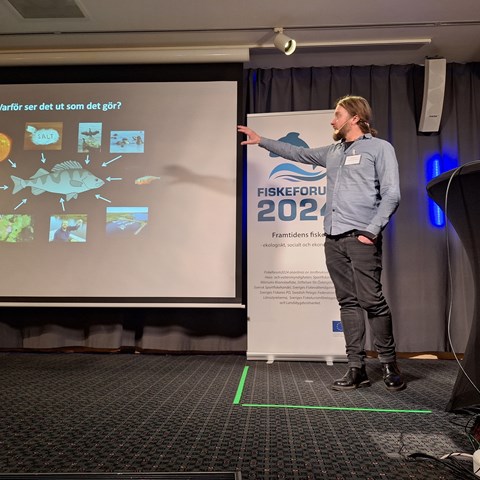Tell us more about Fishing Forum and how come you participated?
– The conference brings together professional and recreational fishermen, fishing tourism entrepreneurs, product and destination developers, fishing rights owners, authorities, financiers and scientific advisors. I was there as an invited speaker and as a researcher and scientific advisor, says Jens.
- And I was there as an invited speaker, researcher and representative of the International Council for the Exploration of the Sea (ICES), David continues.
David, you talked about the Baltic herring, among other things. Can you tell us more about that?
– Yes, I talked about the status of the herring in the Baltic Sea and about what has happened to the Baltic herring population since the last Fishing Forum that took place in 2022. I also took part in a panel discussion where many important issues about the Baltic herring were discussed, including the impact of seals and the risk of overfishing of any subpopulations, says David.
What has happened to the Baltic herring population since 2022?
– At that time, populations in the Gulf of Bothnia and the central Baltic Sea were in decline and were at the reference level where fishing should be reduced. Since then, populations have declined even more and by 2024 populations are estimated to be more than 5% likely to be below the critical level and where recruitment is deteriorating and populations are not sustainable in the long term, even in the absence of fishing. In addition, the proportion of large fish in the populations has decreased further, David continues.
How do you see the future of the Baltic herring population?
– I'm worried. The risk that the herring populations are not sustainable in the long term is now estimated by ICES to be greater than 5% even in the absence of fishing, and yet we continue to fish. I think fishing should be drastically reduced for a period of time in order to give populations a chance to recover. There are many factors that affect the development of herring populations in addition to the fishing itself, such as increased water temperature and the herring's access to food resources, to name a few. However, fishing is a factor we can influence right now.
Jens, in what way did you participate in the conference?
– I was there as an invited speaker and talked about the state of the coast's predatory fish and why the situation is as it is. I also participated in a panel discussion on what we should do to improve the state of fish on the coast, says Jens.
So what should we do?
– Given the local nature of coastal fish stocks, and significant differences in pressure between coastal areas, there is probably no general solution that works everywhere. Instead, you should have a local starting point in the action plan and try to understand what works in that specific coastal area. We discussed several examples of measures such as fishing bans, protection of spawning and nursery areas, hunting and protection against seals and cormorants, and restoration of habitats (both in freshwater and on the coast), says Jens.
There are rumours that the king was there, did you get to meet him?
– Not me, says Jens.
– The King arrived after lunch on the first day, where he gave a speech and listened to presentations and panel discussions, David continues.
Anything else you'd like to share from the conference?
– Yes, something that was fun was that we got to enjoy fish for lunch that you don't eat so often, such as burbot and bream. There were also good discussions, much revolved around the impact of pelagic fishing on fish stocks in the open sea and on the coast of the Baltic Sea. Then there were also interesting discussions about bluefin tuna after Tomas Brodin at SLU gave a fine presentation, Jens concludes.
